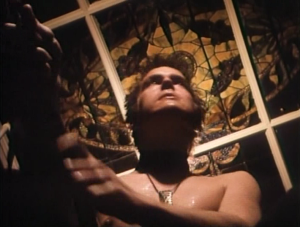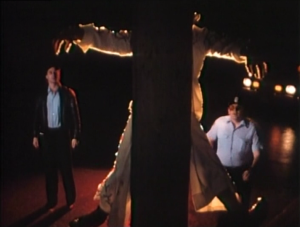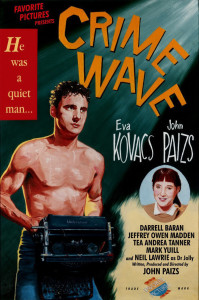 Review: Wisconsin Film Festival
Review: Wisconsin Film Festival
Crime Wave | John Paizs | Canada | 1985 | 80 min
Wisconsin Film Festival, Sundance Cinemas, Wednesday, April 15, 9:15pm»
Akin to a surrealist, after-school-special mix of The Kids in the Hall and In a Lonely Place, the Canadian comedy Crime Wave manages to be “meta” without ever forgetting its primary purpose: to keep you laughing until the credits roll.
When I wrote my initial piece on this year’s Wisconsin Film Festival, I remarked how apt it was that the “Restorations and Revivals” programming had been retitled “Restorations and Rediscoveries.” Indeed, due to the “deep cut” nature of this year’s fest, some of the older films will certainly be discoveries for the fortunate attendees. I’m happy to say that Crime Wave is such a discovery.
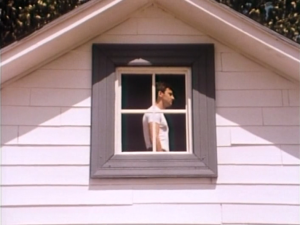 Celebrating its 30th anniversary this year, Crime Wave is a tale about a wannabe screenwriter named Steven Penny (played by writer/director of the film, John Paizs) who lives above the garage of a suburban family. The young daughter, Kim (played with extra “aw shucks” quality by Eva Kovacs), befriends Steven, who is trying to write the greatest color crime film in history. Steven can write beginnings and endings, but it’s the middles that he has to learn how to write. Kim is our narrator and guides us through the multiple incarnations of Steven’s bizarre crime opus.
Celebrating its 30th anniversary this year, Crime Wave is a tale about a wannabe screenwriter named Steven Penny (played by writer/director of the film, John Paizs) who lives above the garage of a suburban family. The young daughter, Kim (played with extra “aw shucks” quality by Eva Kovacs), befriends Steven, who is trying to write the greatest color crime film in history. Steven can write beginnings and endings, but it’s the middles that he has to learn how to write. Kim is our narrator and guides us through the multiple incarnations of Steven’s bizarre crime opus.
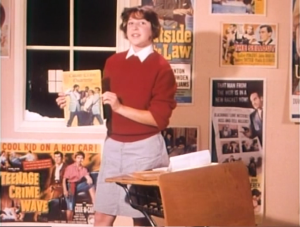 This may sound like a pretty straightforward story, but believe me when I tell you that this is an off-the-rails bonkers film. Whether it’s the plot or the tone, be prepared for this picture to turn on a dime. It’s 80 minutes of hilarious meta-madness for which you should keep your mind limber. The film starts with trappings of classic 1940s/50s crime cinema: booming voiceover narration and a montage that are both in a “ripped from the headlines” fashion. Only instead of fellas in fedoras with .45s ablaze, we see a gangland rivalry among…nope, you didn’t guess it…tribute singers!
This may sound like a pretty straightforward story, but believe me when I tell you that this is an off-the-rails bonkers film. Whether it’s the plot or the tone, be prepared for this picture to turn on a dime. It’s 80 minutes of hilarious meta-madness for which you should keep your mind limber. The film starts with trappings of classic 1940s/50s crime cinema: booming voiceover narration and a montage that are both in a “ripped from the headlines” fashion. Only instead of fellas in fedoras with .45s ablaze, we see a gangland rivalry among…nope, you didn’t guess it…tribute singers!
As is required for comedic excellence, Crime Wave’s laughs are achieved by both visual and verbal means. The first five minutes of the movie, which are devoted to the tribute singer racket, sets the stage for both types of humor. Ronnie Boyles—the Elvis impersonator—is being asked to chip in 5 bucks for equipment rental after a dismal concert, and Boyles is not happy with the guy asking. This exchange follows:
Boyles: What if I said I was broke?
Audio Guy: I’d say the guitar stays behind until you get unnnnnnnbroke. (Note: emphasis is not mine but is in actor’s delivery)
The snappy nature of the line suggests something one might hear in a more traditional crime movie, but the perfectly awkward delivery, coupled with the off-kilter dubbing make it even funnier. The sequence is also full of great visual gags, such as the low angle on the punk rocker’s particularly phallic way of grinding his ax or the way in which the Elvis impersonator meets an almost Christ-like demise.
Paizs knows just how long to hold his shots—an extra second or two for the laughs, but no more than that. Unlike the modern SNL model of sketch comedy, Paizs’ sequences never wear out their welcome. With his scenes referring to persistence of vision, and especially the notion of film viewership as looking at a blank screen, Paizs adroitly inserts meta-commentary without it seeming pretentious, because it’s so wonderfully couched in absurd comedy. Look for the ingenious way the script pages—the actual physical pages held by the characters—are used as transition devices into the realization of Steven’s mad dreams of his color crime opus. There is also some terrific interplay between the non-diagetic music and the diegesis. And as if all that weren’t enough, the use of the phrase “color crime film” eventually guaranteed a laugh from me in the same way that “Oh, geeze,” did in Fargo.
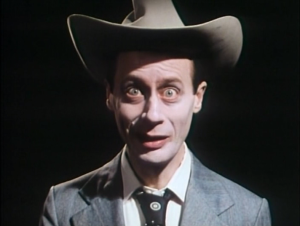 It’s not a perfect film. In the latter half, there are a few diversions and digressions that feel slightly out of place, but none of them last too long. At one point, the film enters a hallucinatory psychosexual phase that is less laugh-out-loud and more disturbing. But thanks to the arrival of Dr. Jolly—who is quite disturbing himself, and may be the single weirdest Texan character ever put to screen—and a few important twists along the way, the movie never stumbles too much in its stride.
It’s not a perfect film. In the latter half, there are a few diversions and digressions that feel slightly out of place, but none of them last too long. At one point, the film enters a hallucinatory psychosexual phase that is less laugh-out-loud and more disturbing. But thanks to the arrival of Dr. Jolly—who is quite disturbing himself, and may be the single weirdest Texan character ever put to screen—and a few important twists along the way, the movie never stumbles too much in its stride.
At publication time, tickets for Crime Wave are still available. If you have room in your festival schedule, I’d recommend fitting this in. If you are a fan of Guy Maddin’s work or The Kids in the Hall, this film will be right up your street. In this year’s showcase of rarities, Crime Wave is the rarest of the rare: a meta-movie commentary that trades pretension for quirky, intelligent humor.
